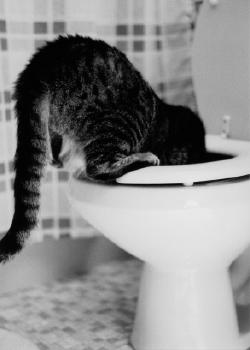Cat Vomiting

I am as guilty as the next person for feeling a little panicked when I see
cat vomiting by one of my cats ...with the exception of Max, who is a
pig-like eater, gets fur balls frequently if I forget to give him his
"stuff" and simply is an over-eating oaf. However, with the others I
start monitoring them closely. You can get a fur ball product in most
pet stores.
Most cats have an occasional vomiting episode during their lifetime. In some cases the reasons for the vomiting is easy to detect. A cat hairball, a change in diet, or a new medication. But if you can't blame any of those, then you start wondering whether to call your veterinarian. Your decision should be guided by the frequency of the cat barf episodes, the amount and content of the vomit, and whether your cat is showing other signs of illness.
If your cat vomits once and is then looking for another meal, you shouldn't be too concerned. Your cat may simply have eaten something...like a plant...that has irritated the lining of the stomach. If your cat vomits several times but shows no other signs of illness, withhold food for 12-24 hours and watch the cat closely.
If the vomiting stops, feed your pet small amounts of bland food, then gradually return to a normal diet over the next several days. But if the vomiting doesn't let up, call your vet. Your pet could have swallowed a foreign body such as a piece of string...which can cause life-threatening intestinal entanglement.
If your vomiting critter becomes lethargic or shows other signs of illness, take him to your vet. These signs could indicate poisoning, infectious disease, or pancreatitis (inflammation of the pancreas). Or, if your cat repeatedly goes to the litter box, but produces little or no urine, it may be suffering from a blockage...and vomit that contains blood, either bright red or black, is a signal to call your veterinarian immediately.
Some cats suffer chronic vomiting ...vomiting regularly, but infrequently, perhaps once or twice a month. Chronic vomiters that show no other signs of illness often suffer from cat inflammatory bowel disease (IBD). IBD is most likely not the culprit, however, when chronic vomiters show other signs of illness. For instance, a cat that drinks and urinates excessively could have kidney disease, diabetes, or feline hyperthyroidism. A cat with heartworm disease will also vomit regularly, as well as a cat with cancer in its alimentary tract.
Since cat vomiting can signal serious illness, we suggest you err on the side of caution and discuss your cat's problem with your vet. The veterinarian can either set your mind at ease or begin some serious sleuthing to uncover the cause of your cat's digestive-tract problems.
The residue from your cat's vomit may stain a carpet or some other area....so choose a spot removal product that is rated highly.
Related Articles......
Return from Cat Vomiting to Cat Health Homepage
Having trouble finding what you need? Cat Health Index & Site Map
OR
Do you have a question to ask?...Questions
OR
Do you have a cat story to share?...Simply click here to go to that page!
Copyright@2010-2020 All rights reserved.Cat-health-detective.com
This website is information only. Consult a veterinarian for medical assistance

"Like Us" on Facebook
or...
"Like Us" here




















